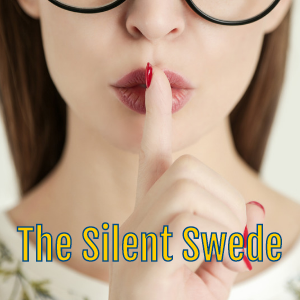
First Impression
If you are on vacation in Sweden your first impression might be that Swedes are unfriendly, distant, and very quiet. And you would be partly correct. But that is until you get to know them a little better. Today I want to explain some of the traits we Swedes often have in common and how you can get to know us a bit better.
Disclaimer
First. Let me say that today I am using stereotyping to its fullest, generalizing a whole population as we were all the same. But as with all stereotyping there is usually a grain of truth behind them.
And if you are a fellow Swede listening to this, please, don’t be offended. I am not talking about you as an individual, I am talking about how we can be perceived from an outsider’s point of view.
From their point of view
Let’s take a look at how for example a tourist from the US might look at us when they first meet us. First, they might notice No talking to strangers, it is quiet in an elevator for example. Swedes are very particular with their personal space, there are unwritten rules about how to sit on public transportation and standing in line. No small talk, not at the cash register, in an elevator, or at the hairdresser for example. Don’t talk about yourself, what you are good at, and your own achievements.
From a Swede’s point of view
Now let’s look at how the Swedes think about these situations;No talking to strangers has nothing to do with stranger danger, this is about not disturbing someone, they might be thinking about something important in the elevator and I do not want to disturb that. Personal space is about not making people uncomfortable and impose me on them. No small talk is my way of respecting your time, I don’t want to waste anybody’s time with unnecessary small talk. Not talking about yourself all stems back to “The Law of Jante” which is a common social trait among all Scandinavian countries. The law of Jante is very complex and deeply rooted in the Swedish social norm system, and I will dedicate my next episode exclusively to The Law of Jante.
Getting to know us
So how can you get to know a Swede, and why should you?
When you get to know a Swede better you will find that in general, Swedes are very giving and supportive. A Swedish friend will always be there for you. If you earn the trust of a Swede they will treat you like family. Swedes are very informal and easy going and you will enjoy their company.
So what should you think about when interacting with Swedes? First, and maybe most important is to give them time. It is not a very fast process. If you ask a question don’t be frustrated if they don’t answer immediately. They are probably considering how they can best answer your question without sounding like they are bragging. This leads me to number two; don’t talk too much about yourself. This is probably the biggest difference between Sweden and the US, and the one I had the hardest time adjusting to after moving here. In the US you are used to people “tooting their own horn”. It is totally acceptable to tell others what you are capable of and what you have achieved. It is even encouraged in many situations. In Sweden, we are the total opposite, much because of the Law of Jante, which says you should never think that you are better than anybody else, and talking about your achievements is seen as bragging. Have you ever for example seen a Swede winning an award and giving a thank you speech? They usually say things like;
I did not do this on my own
I could never have done this without x, y, and z
This award should really go to a, b, and c
And the thing is that they usually really mean it. So if you want to get to know a Swede, don’t talk too much about yourself and your achievements, be patient and wait until they start asking you, and they will.
My third point is about personal space. I think the hardest part of this is realizing when people are actually standing in line. There is usually a very invisible line system, so as a non-Swede you might have to look around. Think of it like this; A Swedish checkout line has always, and still do, use the six feet social distancing template, even before that was a thing. And if you don’t pay close attention you might easily jump the line and step ahead of someone. If that happens, don’t expect someone to say something. No one will shout at you “Hey, the line is back here”. All you will probably hear is people muttering and whispering about how rude you are, but no one wants to draw attention to themselves by calling you out. Today many places use a numbering system where you take a ticket with your number and you will be called when it is your turn, but there are still many situations where a traditional line is used so look around you.
And if you use the public transportation system, which is excellent in most places in Sweden by the way, you need to follow some unwritten rules. For example on a bus, where the seats are placed in pairs facing forward, you never sit down next to someone you don’t know if there are any empty pairs of seats. And on a train or a subway where the pairs of seats are placed facing each other in groups of four seats, your first rule applies that you never sit down in a group of four if someone is sitting there and there are other groups of four opened. If you have to sit in the same group of four as someone else you always pick the seat on a diagonal from the other person, never sit straight across.
And now let’s talk about small talk. Here in the US, it is very common that people small talk in the elevator, at the cash register, at the hairdresser, and so forth. Not so in Sweden, and my general tip is; don’t initiate., don’t even say hello. If you observe Swedes in an elevator for example you can see how they acknowledge edge other when entering with just the tiniest little nod of their head and then avoid eye contact. You will not hear any “How are you today?”. And the same thing when they are exiting, no “Have a nice day” just silence. So my tip is, as I said, don’t initiate, it will make most Swedes feel uncomfortable and a bit nervous, especially if you speak English or any other language. Even though most Swedes speak excellent English, we are not used to speaking it, and I will cover Swedes and English in another episode. We usually don’t know how to respond when someone we don’t know is initiating a conversation and the situation can be very awkward for all parties involved.
Final thoughts
I hope you understand the silent Swede a bit better now, and if you are interested in learning more about the Law of Jante I suggest that you subscribe to my podcast. And if you want to support A Swedish Fika, you can always buy me a cup of coffee at buymeacoffe.com/aswedishfikaUntil next time, as we say in Sweden,
Hej då




